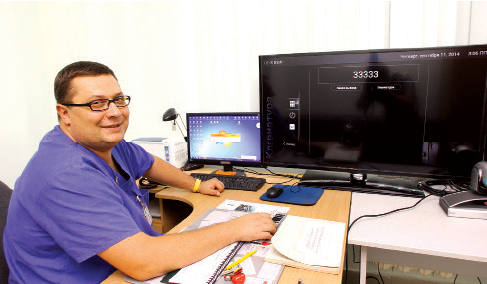Your head aches so that you can hardly bear; it’s probably only a migraine — so you decide to ignore it. You don’t have time to go to the doctor’s clinic. It probably sounds familiar. However, these days, you can use your computer to contact medical help: Minsk Clinical Emergency Hospital has been using telemedicine for some time.

Neurosurgeon Pavel Konovalov at Minsk City Clinical Emergency Hospital
Neurosurgeon Pavel Konovalov starts up two monitors half the size of a window and a rotating video-camera to contact his colleague from Poland. A full length high definition image is soon on the screen, accompanied by perfect sound. It’s as if the foreign professor is in the room, rather than at a distance of thousands of kilometres. Telepresence is like ‘immersion’. Konovalov discusses a difficult case and then transfers electronic versions of pictures of the patient, alongside various medical documents, for his colleague to analyse.
Some might say it’s just like Skype, but more powerful, so why is a separate megasystem required? The answer is that the system needs to be confidential. Moreover, patients may be asked to undress and present themselves for examination over the ‘bridge’. Of course, the system is also of a much higher resolution than Skype and the movable camera is able to ‘track’ six participants simultaneously.
Dr. Konovalov explains, “It’s also convenient for conferences; doctors from our hospital, the Republican Research and Clinical Centre of Neurology and Neurosurgery, can ‘bridge’ with colleagues from Israel or Germany.” The technology is so good that surgery can even be carried out with a remote surgeon providing guidance on where to make incisions and so on.
Telemedicine is universal, being used regularly for training and to take advantage of niche specialists operating at very specific centres. No matter where patients live, they can receive consultations from the globe’s leading authorities. Doctors at the top of their fields are thus able to share their expertise to the benefit of a far greater number of patients, and to promote their colleagues’ skills. The system is financially and ‘time’ efficient.
In future, emergency first aid brigades may have access to telemedicine, using smartphone technology to allow specialist doctors to advise. Neurosurgeons from the Republican Research and Clinical Centre of Neurology and Neurosurgery already give emergency consultations across Minsk, round the clock.
The telemedicine system can also hold an electronic database of patient records, so that all information is to hand at the touch of a button. The Republican Research and Clinical Centre of Neurology and Neurosurgery has been testing the system, with other colleagues soon to follow. It’s easy to see that it’s the future path.











